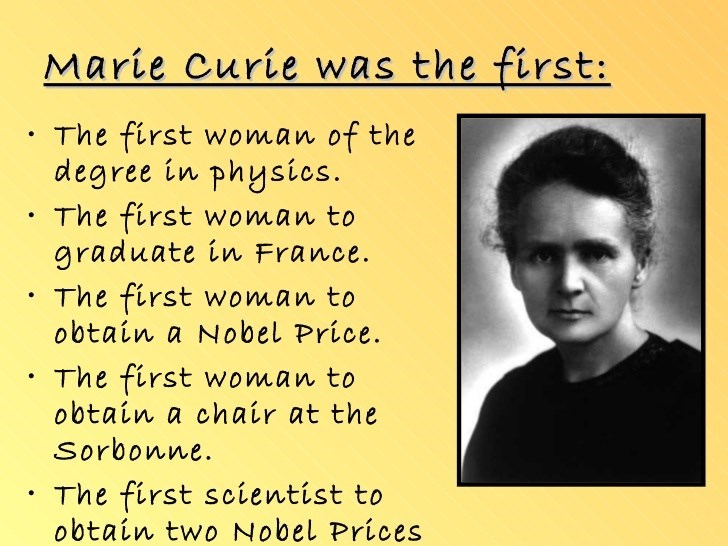 |
| "Marie Curie was the first" (www.slideshare.net) |
"Marie Curie is recognized throughout the world not only for her ground-breaking Nobel Prize-Winning discoveries, but for having boldly broken many gender barriers during her lifetime." Marie Curie was the first woman to win the Nobel Prize which made a stand for all women showing they are something. As well as having many great discoveries with radiation, which impacted her health greatly. Maria Sklodowska later known as Marie Curie was born November 7, 1867 in Warsaw, Poland. "She was the youngest of five children and followed her dad's footsteps." Marie lost her mother when she was 10 years of age due to tuberculosis. A hero must possess dedication and perseverance, which explains her traits perfectly. "She dedicated her life to medicine and helping people in 1932." Marie Curie posses the two traits which makes her a hero: dedication and perseverance.
Marie Curie's had very important discoveries in her time which we can learn from today. "She and her husband made huge breakthroughs in understanding radiation, including the discovery of two elements: polonium, named after her native Poland, and radium, named for its potent radioactivity."(Marie Curie: How She Changed The World) "Now that we have her great discoveries we are able to restore sight of blind, treat cancer patients, sterilize medical instruments, more."(How was Marie Curie's Work Shaped the modern World?) Without her discoveries we wouldn't be able to do as many things as we can do today. She even was around so much radiation that she got Aplastic anemia, which is the deficiency of all types of blood cells by failure of bone marrow development. "Curie's legacy still inspires women to achieve "firsts."(Marie Curie: How She Changed The World) Lauren Redniss's recent biography of Curie, "Radioactive," is the first nonfiction graphic narrative become a finalist for the National Book Award. Marie stands as a great example for all people, showing that they can accomplish anything if they put time into it. She broke barriers for women, showing that they can win something, discover something, anything. That is how her discoveries impacted the world.
"Health and Financial concerns were not the only problems to plague the Curies as Marie wound up her thesis research. Hardship would soon follow Marie once again with her husband dying in an accident."(Marie Curie) Thus making her work harder and making other scientists jealous of her stunning work. "During World War I, Marie worked as an "X-ray technician," taught radiological technology, and equipped mobile X-ray vans to assist in the war effort."(Marie Curie) This making her health even worse she worked as hard as usual without anything getting in her way. Even though the Nobel Prize committee was sexist towards her they finally accepted the fact she deserved it.
This is why Marie Curie is a hero she devoted most of her time to work in a lab. She is an inspiration to all scientists and women. Things don't come easy, you need to work and more than once to get it right. She makes a great example for all women showing they can get recognition for being the "first" to discover something. All her discoveries show her dedication to the cause that she fought for, and despite all of the afflictions she obtained, she still worked to help find a cure for cancer. Her hard work and perseverance were qualities which were vital to her success in her discovery of polonium and radium, which has impacted our society immensely. Her life embodies the idea that not giving up can lead to success.McHugh, Brendan. "Marie Curie: 7 Facts on the Groundbreaking Scientist."Bio.com. A&E Networks Television, n.d. Web. 14 May 2016.
"Marie Curie Timeline." Marie Curie Timeline. N.p., n.d. Web. 14 May 2016.
"Marie Curie." Bio.com. A&E Networks Television, n.d. Web. 14 May 2016.
Gaylord, Chris. "Marie Curie: How She Changed the World." The Christian Science Monitor. The Christian Science Monitor, 07 Nov. 2011. Web. 14 May 2016.
"How Has Marie Curie's Work Shaped the Modern World?" Marie-Curie -. N.p., n.d. Web. 14 May 2016.
"Marie Curie." Marie Curie. N.p., n.d. Web. 14 May 2016.
Page created on 5/22/2016 12:00:00 AM
Last edited 5/22/2016 12:00:00 AM
